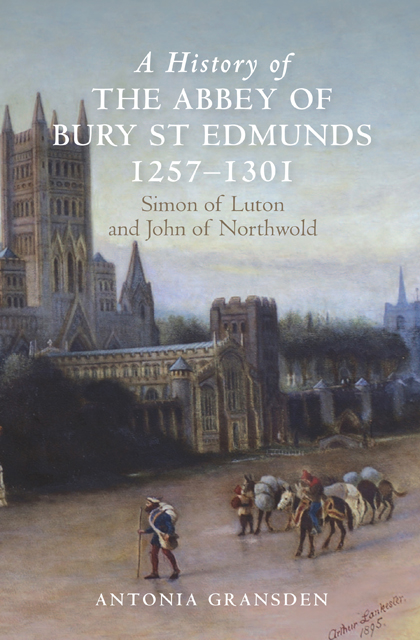Book contents
- Frontmatter
- Dedication
- Contents
- List of plates
- List of figures
- Preface
- Editorial note
- Dedication
- Acknowledgements
- Abbreviations
- Maps and plans (figures 1–11)
- Part I Introduction
- Part II Abbatial Governance
- Part III The Abbey’s Economy
- Part IV Religious Life and Reform
- Part V Intellectual and Cultural Life
- Appendix I The identity of the abbot’s justices, Henry of Guildford and Henry of Shenholt (in 1287)
- Appendix II The monks’ dietary regime: their food and drink
- Select List of the Registers and Customaries Cited
- Select List of Further Manuscripts Cited
- Select Bibliography
- Index
- Backmatter
2 - Abbot Simon of Luton’s Early Problems
Published online by Cambridge University Press: 22 February 2023
- Frontmatter
- Dedication
- Contents
- List of plates
- List of figures
- Preface
- Editorial note
- Dedication
- Acknowledgements
- Abbreviations
- Maps and plans (figures 1–11)
- Part I Introduction
- Part II Abbatial Governance
- Part III The Abbey’s Economy
- Part IV Religious Life and Reform
- Part V Intellectual and Cultural Life
- Appendix I The identity of the abbot’s justices, Henry of Guildford and Henry of Shenholt (in 1287)
- Appendix II The monks’ dietary regime: their food and drink
- Select List of the Registers and Customaries Cited
- Select List of Further Manuscripts Cited
- Select Bibliography
- Index
- Backmatter
Summary
An immediate challenge facing Abbot Simon was the intrusion of the Friars Minor into St Edmunds’ spiritual immunity, the Liberty of the banleuca. The intrusion resulted in a prolonged dispute, the course of which can be traced in royal and papal records and in the narrative sources. The latter deserve particular attention because of what they reveal of the attitudes of the parties to the dispute and the use made of historiography by the monks to substantiate their claims and justify their acts.
The principal narrative sources for this dispute are: the Bury Chronicle, which at the time of the dispute was being composed within a few years of events; the Narratio quaedam de processu contra fratres minores qualiter expulsi erant de villa Sancti Edmundi (‘A certain narrative about the proceedings against the Friars Minor [and] how they were expelled from the town of St Edmunds’); and the Processus executorum in re expulsionis fratrum minorum (‘The proceedings of those executing the expulsion of the Friars Minor’).
The Processus includes copies of numerous documents relating to the activities of the judges-delegate whom Pope Urban IV commissioned in 1263 to settle the dispute between St Edmunds and the Friars Minor and ends with the defeat of the friars’ claims. The text survives in a fourteenth-century copy in the Warkton register, BL MS Harley 638, ff. 33–6. There are, moreover, fourteenth-century copies of two documents related to the dispute, but not included in the Processus, in the Kempe register, BL MS Harley 645, ff. 209, 209v. They are: the bull of Pope Alexander IV, dated 17 February 1257, supporting the settlement of the Friars Minor in the town; and two sets of propositions, of eight and eleven clauses respectively, both contending that the friars had no right to settle within St Edmunds’ exempt Liberty of the banleuca. The first set argues the monks’ case on grounds of law concerning lords and tenants, and the second because the friars’ settlement violated the abbey’s papal privileges. The Processus is, in effect, in three parts: first, the proceedings of the judges delegate; secondly, two letters of King Henry III in support of the claim of the Friars Minor to settle in the town; and finally, the mandate of Pope Gregory to the judges delegate ordering the expulsion of the Friars Minor from Bury St Edmunds.
- Type
- Chapter
- Information
- A History of the Abbey of Bury St Edmunds, 1257-1301Simon of Luton and John of Northwold, pp. 15 - 25Publisher: Boydell & BrewerPrint publication year: 2015



